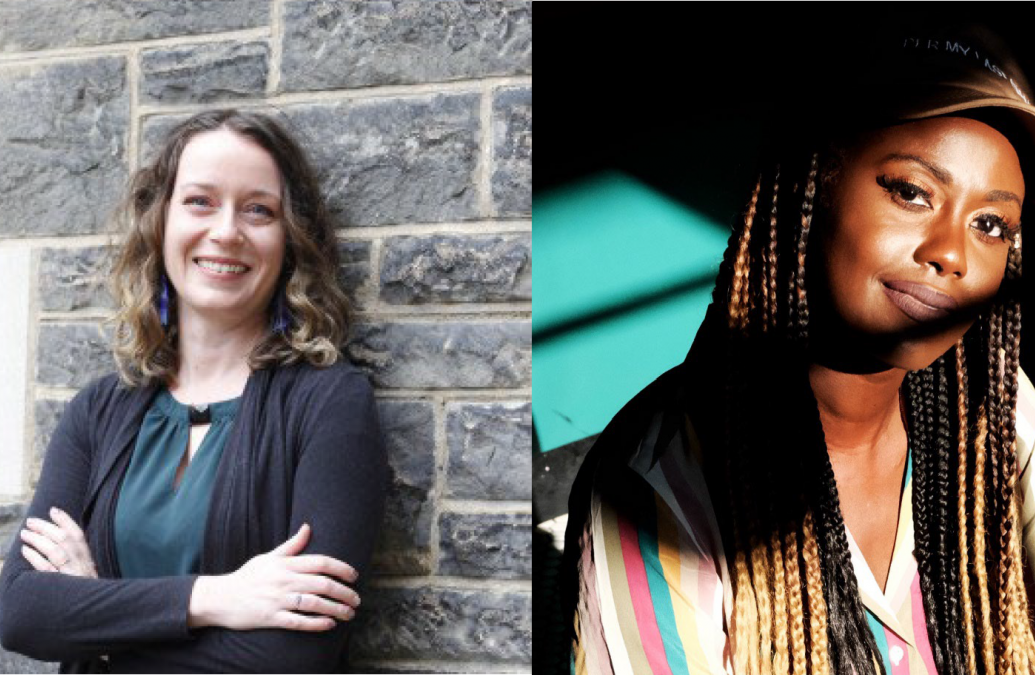Engaged Faculty Spotlight: Faculty Members and Community Collaborators in the Classroom

Image of Drs. Sarah Williams (left) and Enongo Lumumba Kasongo (right)
Sarah Williams, PhD, Louise Lamphere Visiting Assistant Professor of Anthropology and Gender Studies, leaves a substantial legacy of engaged scholarship as she prepares to leave Brown for the University of Connecticut. This year her Reproductive In/Justice seminar included a lab section taught by Latham Thomas, a doula, educator, and executive director of the Mama Glow Foundation, who was given a Visiting Assistant Professor of the Practice appointment for the course. Both were important mentors to Leona Hariharan, a former Royce Fellow who also collaborated with them as a CBLR Fellow and is working with other student leaders of Doulas@Brown to sustain both local and national partnerships.
Students enrolled in the Gender and Sexuality Studies course (cross-listed with Medical Anthropology) could earn a Birth Doula certificate through trainings that were open to community members as well. Student assignments have involved creating resources defined as useful by doula networks. The Rhode Island Birthworker Co-op, for instance, will use a new database of local clinics to inform potential clients of the coverage available under the Rhode Island Doula Bill, while the Rhode Island Doula Collective will disseminate the students’ summary of midwifery insurance policies and regulations doulas who may be interested in pursuing midwifery. Hariharan credits Williams with teaching her “a lot about what it means to follow the community’s lead and how to build trust and authentically connect.”
Williams writes that her “priorities in teaching are twofold: to provide students with a solid foundation in analysis, critical thinking, and writing, and to approach course design and pedagogy in such a way that students are guided in developing the tools and knowledge base that they need in order to understand how the most pressing problems we face—structural racism, climate change, gender inequality, health disparities—came to be, are sustained, and can be addressed through community-engaged scholarship and activism.” Mama Glow’s focus on “birth equity,” with particular attention to BIPOC and LGBTQ+ families and birthworkers, contributes to the course’s integration of critical theory and practice.
Enongo Lumumba Kasongo, PhD, David S. Josephson Assistant Professor of Music, also uplifts the voices and presence of community partners in the classroom – and brings her own creative practice into many different spaces. In addition to teaching courses on rap songwriting, feminist sound studies, and Black feminist sonic practices, she is the Director of Audio at Glow Up Games, the first women-of-color led game studio, a member of TheKEEPERS Hip Hop collective, and the director of in-development Brown Arts Institute initiative Black Music Lab, which aims to create a hub for people and events on campus and in the community.
Lumumba Kasongo has taught an Intro to Rap Songwriting with local Hip-Hop artists as guest speakers with support from BAI paid a sound engineer, Edgar Cruz aka Vertygo, and Beatbox Studio in Pawtucket to mix and master student-written songs. In the next iteration of the course she will collaborate with Providence-based Cape Verdean artist Chachi Carvalho and Anjel Newmann, the Co-Executive Director of AS220, who is also an Afrofuturist MC and a faculty member at College Unbound. She hopes to open up four spots in the Fall 2023 class to students from College Unbound, which “focuses on adult learners who have faced significant barriers to attending college,” creating new opportunities for exchange among a diverse array of students.
These faculty have seen the energy that comes from fostering learning on- and off-campus, with community members as co-teachers, learners, and generators of knowledge. Starting with collaboration on a specific course can also plant the seeds for deeper engagement over time – stewarded by instructors but also community partners and students with vision and determination to address the issues that matter to them.
